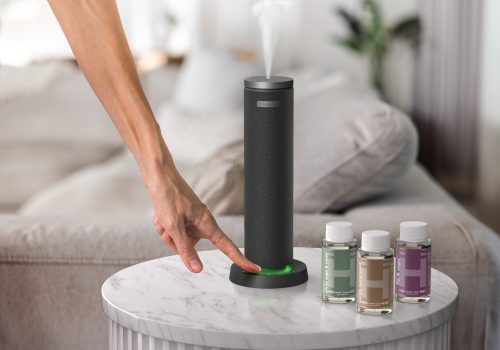It’s Time to Check in on Your Well-Being
Now that we’ve been facing a global pandemic for over a year, it’s important to take steps to focus on ourselves—both mentally and physically. Start by checking in on your well-being. Are you struggling to accept things you can’t control? Have the lines between work and home life become a little too blurred? Are you making time for self-care? If you answered yes to any of these questions, read on to find out how you can adjust your mindset and get back to a healthier, happier you.
PATIENCE IS A VIRTUE (AND A SKILL)
It’s easy to get irritated at minor inconveniences, from perpetually late friends to long lines at the grocery store to sitting in traffic for hours. Once you accept that you have absolutely no control over these things, your well-being will improve (seriously!).
In an article written by the Mayo Clinic staff, it’s noted that those of us who are more patient and empathetic feel greater gratitude, are less stressed, and have an increasingly positive outlook on life. Luckily, even if you aren’t a naturally patient person, it’s something that can be learned.
Meditation and mindful movements, such as practicing yoga, tai chi, qigong, or even taking a walk through nature, can help reduce stress, limit negative thinking, and improve your levels of patience. By controlling and focusing on your movements, you can learn how to tune into your breath and body.
CREATE A DESIGNATED DESK SPACE
It’s important to keep your well-being top of mind as you work from home. While it may seem cozier and like the better option, always being a click away from your email isn’t always healthy. So, while you blur the lines of work and home, here are a few tips to keep your day in check.
GET IN TUNE WITH NATURE
Try to set your desk up in a well-lit area and add some plants to your home office. Being in an environment that resembles nature has been found to boost moods.
SET BOUNDARIES!
Create space for yourself to have lunch during the day. When you’re done for the day, close your laptop or turn off your computer. It’s also important to set boundaries with friends, roommates, kids, and significant others while you work. Let them know that while you’re working, you need the space and privacy to do so.
MORNING ROUTINE
Finding a good morning routine that gets you out of bed and ready for the day (even if you aren’t leaving your house) is extremely important to your mental and physical well-being. Here are some tips to prepare your mind for the workday.
Start your day off right by giving yourself ample time to wake up and prepare your mind for work. Try waking up at the same time every day, making sure to give yourself enough time to eat breakfast, read a book, listen to a podcast, or exercise before you log on. Start your day with breathwork, by meditating, or going through a yoga flow to give your mind some balance. And finally, if you’re getting burnt out on work because even when you’re home you still feel like you’re at the office, try spending a few minutes focusing on what you do enjoy about your job before you start your day.
THE LOVE YOU DESERVE
Self-care is the practice of taking action to preserve or improve one’s own health. It’s also a phrase that gets thrown around often without embracing the full meaning of it, the importance, or the correct way to go about practicing it. In an article for Healthline, self-care coach Gracy Obuchowicz breaks self-care into three areas to successfully reap all the benefits:
Obuchowicz also notes that making small adjustments to your self-care routine gives you a stronger sense of accomplishment that can help lead to continuing your growth journey over time. It’s also important to keep in mind that only exposing yourself to one area of self-care won’t help you reap the full benefits. For example, if you’re working out daily but not eating healthy, or you’re meditating but not improving your sleep routine, you won’t see the effects of the good you’re doing for yourself.
According to an article from the Mayo Clinic, compassion researcher Kristin D. Neff Ph.D. found that speaking to yourself in a positive manner, realizing that you’re not the only person going through what you’ve gone through, and practicing mindfulness regularly can help counteract the negativity you’ve shared with yourself.
As we get closer to returning to some sense of normalcy, remember to take the time and steps necessary to enhance your well-being, and be sure to give yourself plenty of grace along the way.

Medical Disclaimer: This content is provided for informational purposes only and not intended to be a substitute for professional medical advice, diagnosis or treatment.
SOURCES
3 Ways to Learn Patience and Amp Up Your Well-Being, Mayo Clinic: https://www.mayoclinic.org/healthy-lifestyle/stress-management/in-depth/3-ways-to-learn-patience-and-amp-up-your-well-being/art-20390072
8 Tips for Caregivers Working from Home, Cleveland Clinic: https://my.clevelandclinic.org/-/scassets/files/org/landing/preparing-for-coronavirus/work-from-home-web.ashx?la=en
Mayo Clinic Q&A: Staying Healthy While Teleworking, News Network: https://newsnetwork.mayoclinic.org/discussion/mayo-clinic-q-and-a-staying-healthy-while-teleworking/
Be Kind to Yourself: How Self-Compassion Can Improve Your Resiliency, Mayo Clinic: https://www.mayoclinic.org/healthy-lifestyle/adult-health/in-depth/self-compassion-can-improve-your-resiliency/art-20267193#:~:text=Subscribe%20to%20Housecall-,Be%20kind%20to%20yourself%3A%20How%20self%2Dcompassion%20can%20improve%20your,and%20more%20compassionate%20toward%20others
Why You Don’t Need a Lot of Time Or Money to Make Self-Care a Priority, Healthline: https://www.healthline.com/health-news/self-care-is-not-just-treating-yourself#How-to-incorporate-self-care-habits





